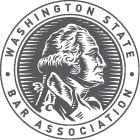Malpractice Insurance Disclosure: Board to Consider Sending a Rule Proposal to the Court
UPDATE, Sept. 21, 2020: During its September meeting, the Board of Governors voted to send a modified version of the proposed RPC amendment to the Washington Supreme Court for recommended approval. The board modified the rule amendment to lower the required minimum coverage amount to $100,000 per occurrence/$300,000 total per year and to remove certain notification requirements. WSBA will keep members updated if and when the Court begins its own process to consider the rule amendment, which could include publishing it for comment.
- Final RPC 1.4 proposed amendment as approved by the Board of Governors
- Board of Governors Meeting Materials from September 2020 meeting (page 394) and member feedback (page 12)
UPDATE, Sept. 9, 2020:. The Committee to Investigate Alternatives to Mandatory Malpractice Insurance met on Sept. 9 to consider feedback from the WSBA Board of Governor’s first read of the proposed rule amendment in August. The Committee revised the draft rule to narrow the scope of additional notice requirements to include only written communications with clients, written solicitations of new clients, and a lawyer’s website. This requirement would be in addition to the proposed rule’s requirement of disclosure at the time of commencement of the representation of a client.
Read the revised rule amendment to go before the Board of Governors in September.
Original post Sept. 4, 2020
Malpractice Insurance Disclosure: Board to Consider Sending a Rule Proposal to the Court
At its September business meeting, the WSBA Board of Governors will consider whether to propose to the Washington Supreme Court a rule change that would require lawyers, with exceptions, to disclose to clients if they do not have malpractice insurance.
Specifically, the proposed addition to Rule of Professional Conduct (RPC) 1.4 would require practitioners who lack a minimum threshold of malpractice insurance (at least $250,000 per occurrence and $500,000 in the aggregate) to provide notice to and obtain consent from clients.
The disclosure/consent requirement would primarily apply to private practitioners who lack malpractice insurance coverage. Under the draft amendment, it would expressly not apply to judges, arbitrators and mediators not otherwise engaged in the practice of law, in-house counsel for a single entity, government lawyers practicing in that capacity, and employee lawyers of nonprofit legal services organizations or volunteer lawyers where the nonprofit entity provides malpractice insurance coverage at the minimum levels.
Read the proposed change to the RPC. (See page 4)*
PLEASE NOTE: The proposal has since been updated. Read the most current draft to go before the Board in September.
The board’s Committee to Investigate Alternatives to Mandatory Malpractice Insurance recommended the RPC amendment in August. The board formed this ad hoc committee in January 2020 after declining the previous year to support a task force’s recommendation to mandate malpractice insurance for most private practitioners. The board will take up the proposed amendment as an action item in September.
The Court is the only authority that can approve RPC amendments. If the WSBA Board of Governors votes to recommend this RPC amendment to the Court in September, the Court will likely follow its typical process of publicizing the proposal for public comment prior to a decision.
In the meantime, WSBA members and the public can provide feedback to the Board of Governors prior to the September meeting and/or during the comment period at the meeting.
Send feedback to the Board of Governors here prior to the September meeting.
Background
Spurred by an interest in protecting clients harmed by uninsured lawyers, the Board of Governors created a Mandatory Malpractice Insurance Task Force, a multi-stakeholder research group that met from January 2018 to February 2019. The Task Force ultimately issued a report and recommendation to require malpractice insurance as a condition of licensing for the majority of private-practice lawyers. The task force recommended a minimum insurance level of $250,000 per occurrence/$500,000 total per year.
The Board of Governors received many concerned comments from members about the proposal. The board also heard from clients who have been harmed by lawyers who did not carry malpractice insurance. Ultimately, in May 2019, the board declined to support the task force’s recommendation. The majority of governors agreed the proposed rule was overbroad. However, many on the board stated their continued interest in finding a way to protect clients from risks created when lawyers practice without malpractice insurance.
In late 2019, the entity Equal Justice Washington, which has no affiliation with WSBA, submitted a proposed amendment to the Admission and Practice Rule 26, which mirrored the task force’s recommendation to require acquisition of malpractice insurance by Washington lawyers in private practice. In response, WSBA President Rajeev Majumdar submitted a comment of opposition on behalf of the Board of Governors, stating the reasons the board declined to endorse the same rule earlier in the year.;
Please note: The Court has extended the comment period for the APR 26 proposed amendment to Sept. 30, 2020; send comments of no more than 1,500 words to supreme@courts.wa.gov.
At the same time, President Majumdar called on WSBA to evaluate alternatives to mandatory malpractice insurance that would meaningfully protect the public. He formed the ad hoc Committee to Investigate Alternatives to Mandatory Malpractice Insurance in January 2020 to investigate and research the topic, building on the work from the previous task force.
In August 2020, the Committee to Investigate Alternatives to Mandatory Malpractice Insurance returned to the Board of Governors with a recommendation to add a new section to RPC 1.4 to require lawyers, with exceptions, to disclose to clients if they do not carry malpractice insurance. The Board of Governors will decide at its September meeting whether to send the proposed amendment to the Supreme Court with a recommendation to adopt it.






